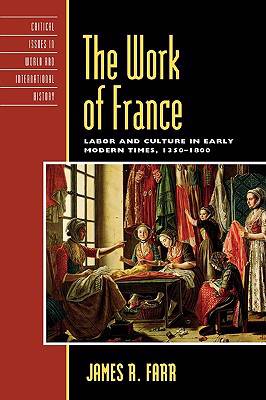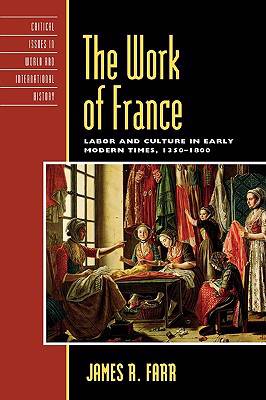
- Afhalen na 1 uur in een winkel met voorraad
- Gratis thuislevering in België vanaf € 30
- Ruim aanbod met 7 miljoen producten
- Afhalen na 1 uur in een winkel met voorraad
- Gratis thuislevering in België vanaf € 30
- Ruim aanbod met 7 miljoen producten
Zoeken
€ 88,45
+ 176 punten
Uitvoering
Omschrijving
This clearly written and deeply informed book explores the nature and meaning of work in early modern France. Distinguished historian James R. Farr considers the relationship between material life--specifically the work activities of both men and women--and the culture in which these activities were embedded. This culture, he argues, helped shape the nature of work, invested it with meaning, and fashioned the identities of people across the social spectrum.
Farr vividly traces the daily lives of peasants, common laborers, domestic servants, prostitutes, street vendors, craftsmen and -women, merchants, men of the law, medical practitioners, and government officials. Work was recognized and valued as a means to earn a living, but it held a greater significance as a cultural marker of honor, identity, and status. Constants and continuities in work activities and their cultural aspects shared space with changes that were so profound and sweeping that France would be forever transformed. The author focuses on three salient, interconnected, and at times conflicting developments: the extension and integration of the market economy, the growth of the state's functions and governing apparatus, and the intensification of social hierarchy.
Presenting a unified and compelling argument about the role of labor in society, Farr addresses a complex set of questions and succeeds masterfully at answering them. With its stylish writing and clear themes, this book will find a broad audience among students and scholars of early modern Europe, French history, economics, gender studies, anthropology, and labor studies.
Farr vividly traces the daily lives of peasants, common laborers, domestic servants, prostitutes, street vendors, craftsmen and -women, merchants, men of the law, medical practitioners, and government officials. Work was recognized and valued as a means to earn a living, but it held a greater significance as a cultural marker of honor, identity, and status. Constants and continuities in work activities and their cultural aspects shared space with changes that were so profound and sweeping that France would be forever transformed. The author focuses on three salient, interconnected, and at times conflicting developments: the extension and integration of the market economy, the growth of the state's functions and governing apparatus, and the intensification of social hierarchy.
Presenting a unified and compelling argument about the role of labor in society, Farr addresses a complex set of questions and succeeds masterfully at answering them. With its stylish writing and clear themes, this book will find a broad audience among students and scholars of early modern Europe, French history, economics, gender studies, anthropology, and labor studies.
Specificaties
Betrokkenen
- Auteur(s):
- Uitgeverij:
Inhoud
- Aantal bladzijden:
- 246
- Taal:
- Engels
- Reeks:
Eigenschappen
- Productcode (EAN):
- 9780742534001
- Verschijningsdatum:
- 16/12/2008
- Uitvoering:
- Paperback
- Formaat:
- Trade paperback (VS)
- Afmetingen:
- 152 mm x 224 mm
- Gewicht:
- 362 g

Alleen bij Standaard Boekhandel
+ 176 punten op je klantenkaart van Standaard Boekhandel
Beoordelingen
We publiceren alleen reviews die voldoen aan de voorwaarden voor reviews. Bekijk onze voorwaarden voor reviews.











